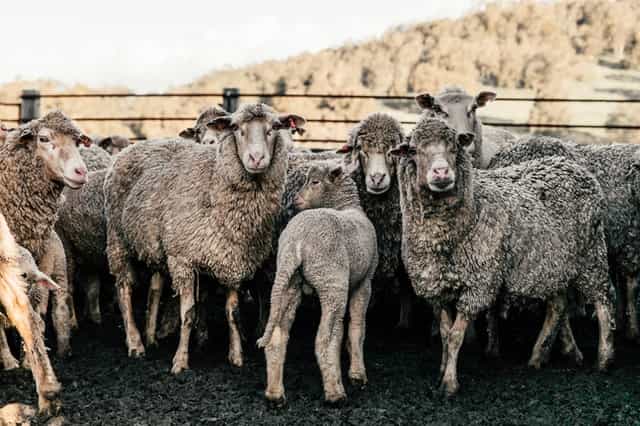9 things to know about sheep farming

Sheep farming is undoubtedly one of the oldest traditional businesses in the world. However, it’s certainly not an easy job. Whether you want to raise sheep on a small farm or commercial level, you need the desired facilities and, of course, the management. Here in this article, you’ll find 9 things to know about sheep farming.
The advancement in technology has enabled the farmers to use sheep farm management software to take care of the sheep, thereby minimizing the requirement of on-ground resources.
Read along to learn about the 9 things you should know before raising and looking after the sheep.
Sheep Farming
Before we get into the details on how to look after sheep, let’s briefly discuss sheep farming and its advantages. The primary purpose of sheep farming is to rear sheep for the commercial purposes of selling milk, meat, and wool. It’s certainly a profitable business that guarantees returns on your investment in a relatively short period.
However, it’s essential to manage the sheep enterprise using the latest technology and sheep livestock management software.
How to Look After Sheep?
9 things to know about sheep farming
Sheep Farm Management Software
Courtesy of the technology, the farmers can use state-of-the-art sheep livestock management software to monitor the ground facilities via their smartphones. Not only that, but they can check live updates from the farm about the food, inventory, and breeding.
The farmers can keep a record of the total sheep, their health, and their weight. Moreover, they can keep track of the feed available in the inventory and the total purchases of medicines.
Moreover, advanced sheep farm management software enables the farmers to categorize the sheep and make groups to save time.
Lastly, livestock management software offers daily and monthly reports. It provides a dashboard to the farmers to analyze the performance and make timely decisions to improve the sheep farming business plan.
Understand the Feeding Requirements
First, you must understand the type of feed required by the sheep. For instance, you need to figure out which hay is suitable for the sheep. Many sheep feed exclusively on the grass in addition to water and a block of salt; however, you need to add supplements if you have less pasture.
The good news is that sheep don’t need grains because they are ruminants. So the best way to keep track of the feed is to use sheep farm management software to manage daily feed and understand the feeding requirements.
Normal Vs. Abnormal Sheep Behavior
You must regularly monitor the flock to see if the sheep are behaving normally or not. For instance, many lambs call one another before the sunset. It’s completely normal behavior because they group with the mothers. However, if the pattern changes and you don’t hear from them, and later they become extra noisy, it’s better to check on them.
The advanced sheep livestock management software comes with sensors to monitor the farm and capture real-time data. This way, the software gathers information from all the facilities and automatically checks for abnormalities. Lucky for you, the software also monitors sheep health and generates alerts if any sheep falls sick.
Sheep Reproduction Cycle
If you want to profit from sheep farming, you should know the sheep’s reproduction cycle. You can have lambs five months after the breeding; however, you need to keep in view the seasons. Lambing is the most challenging task in the cold season compared to spring.
You should know when to mate the rams with ewes. For instance, you’ll get your lambs on the first of May if you let the rams run into the flock on the first of December. Moreover, your lambs should undergo extensive health checks before breeding if you want to increase the total number of lambs born.
Here, sheep livestock management software is a perfect option for tracking the breeding season, lamb’s health, and labor timing.
Seasonal Changes Need Additional Management
In the cold and rainy seasons, the internal temperature of the sheep drops, and you need to keep them warm by adjusting the farm’s temperature. Similarly, the flock requires access to plenty of freshwaters during the summers; else, they’ll have a heat stroke.
You should know that sheep require feed and water all year round. That’s why you need to monitor the provision of food in case anything lacks during a seasonal change. In addition, you should keep the sheep inside, especially in harsh winters, and keep them warm using heaters.
Routine Is the Key
As a sheep farm owner, it’s your responsibility to make sure all the sheep do the same thing at the same time. For instance, you may be in trouble if one sheep stands while the rest of the flock is laying or vice versa.
Obviously, ewes and lambs act differently, and the same rule applies to different age groups of sheep.
If you see any abnormality in the routine, you must consult the vet to see if there is an infection or a problem with the lamb.
Your Sheep Requires Attention
The farmers can avert any emergency by using sheep farm management software and daily tracking the sheep’s health and routine patterns. The software generates alerts and notifications if it sees any anomaly in a sheep’s behavior. It’s because the sheep require prompt care instead of waiting for days.
Sheep tries their best to behave like the rest of the flock; that’s why if a sheep isn’t feeling good, it requires instant attention.
Habits of a Happy Sheep
If the sheep chews her cud, it means she is happy, and things are going great. Conversely, a sick sheep doesn’t do that. If a sheep is standing or laying oddly while the rest of the flock is doing something else, you don’t need to worry about it if it’s chewing her cud.
Understand the Sheep Reaction
It’s a misconception to consider sheep dumb or stupid; instead, they are reactors to sudden changes in the environment. Yes, sheep sometimes overreact, making things difficult for the shepherd; however, still, they can sense a threat or a nearby predator and react quickly.
Final Thoughts
From health and care to facilities and technology, looking after sheep is a big challenge. Not only that, but you need to take care of the nutrition and feeding, reproduction, production management, and of course, product quality.
See also Top 10 agriculture trends



